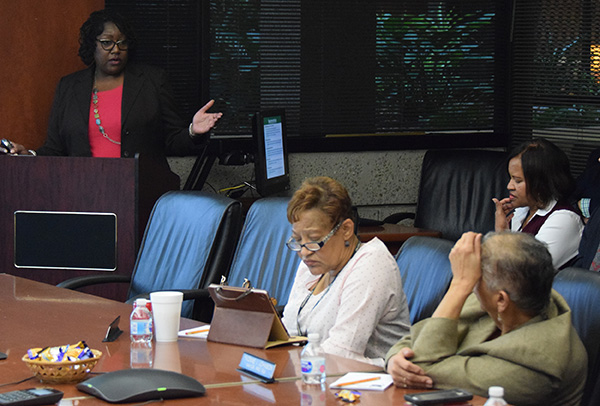The Greensboro City Council is all set to approve the new Minority and Women’s Business Enterprise (MWBE) program at its Feb. 19 meeting.
Or so it seems, since when Assistant City Manager Barbara Harris gave the City Council a briefing on the new program at the Council work session on Tuesday, Feb. 5 in the Plaza Level Conference Room, no one raised any serious objections.
Harris went over the major changes, like the fact that the program has lost any focus on local businesses, unless you consider businesses in Raleigh, Durham, Warrenton and Boonville local.
The 27 county area which will be covered by the new MWBE program is based on North Carolina Department of Transportation districts, but not entirely which seems to negate the whole idea of using districts defined by the government. If you want to use districts established by the government, doesn’t it make sense to use the districts. But in this case Surry and Yadkin counties which are not in any of the four NCDOT districts designated by the plan were added.
The reason the NCDOT districts were used has been explained several times and it’s hard to make any sense of it.
The disparity study was released in March 2018, and speakers from Greensboro Business League and others came to City Council meetings in June, 2018 demanding immediate action on the recommendations in the study.
The plan presented by Harris includes expanding the MWBE office and other initiatives suggested by those critical of the current program, but it won’t go into effect until the beginning of the next fiscal year which is July 1.
No one on the City Council asked how much the expanded new program would cost.
But the best part of the entire proposed plan wasn’t discussed at all by the City Council. It’s kind of a long passage of legalize but it’s worth reading.
“It is the policy of the City not to enter into a contract or to be engaged in a business relationship with any business entity that has discriminated in the solicitation, selection, hiring or commercial treatment of vendors, suppliers, Subcontractors or commercial customers on the basis of race, color, religion, ancestry or national origin, sex, age, marital status, sexual orientation or on the basis of disability or any otherwise unlawful use of characteristics regarding the vendor’s, supplier’s or commercial customer’s employees or owners; provided that nothing in this policy shall be construed to prohibit or limit otherwise lawful efforts to remedy the effects of discrimination that have occurred or are occurring in the Relevant Market.”
What that says in layman’s terms, is that the city won’t do business with any company that discriminates against anyone with the notable exception that the city requires these same businesses to discriminate in favor of minorities and women or it won’t do business with them.
The policy notes that it is discriminatory, but that it is legal discrimination.

